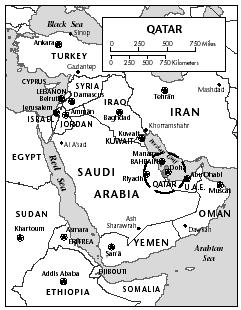Qatar - Domestic policy
Despite fluctuations in oil prices and demand throughout the last three decades, Qatar has managed to return to a somewhat stable economy. In 2000, the government continued in its efforts to implement policies aimed at diversifying income sources and developing the economic infrastructure. Sheikh Hamad has been an advocate of the rapid development of Qatar's vast offshore natural gas reserves and other industrial projects as an alternative to oil. The development of the North Field natural gas reserves, however, depends on Qatar's success on securing foreign financing. Under Sheikh Hamad, the Qatari government has continued to work closely with foreign and domestic investors in developing the country's economic resources, and it is expected that these ties will continue to grow in the future. Qatar has the third-largest natural gas reserves in the world. Liquefied Natural Gas (LNG) earnings will increase as Qatar supplies the Asian market. The government estimates oil production of 900,000 barrels per day by the year 2004. Production

enhancement programs have already succeeded in increasing oil production capacity to over 700,000 barrels per day.
Sheikh Hamad has eased immigration rules and offered tax breaks to overseas investors. As of March 2003, economic growth in Qatar averaged 13.5% over the past five years.
Though it was widely believed that the deposed emir, Sheikh Khalifa, was behind a plot discovered in February 1996 to return to power, Sheik Hamad reconciled with his father later that same year, thus calming some of the opposition from Khalifa's allies.
Sheik Hamad has announced his intention for Qatar to move toward democracy. He has permitted a free and open press (including the establishment of the satellite TV station Al Jazeera) and allowed for the election of the Qatar Central Municipal Council by universal suffrage in 1999. Although all successful candidates were men, women were permitted both to vote and stand as candidates. Some women have been appointed to leading government positions. The 1999 elections serve as a precursor to parliamentary elections expected to occur in 2003 or 2004. In accordance with the emir's earlier promise of an elected Advisory Council (parliament), a 32-member committee was formed in July 1999 to draw up a comprehensive and permanent Constitution for 2003. In an effort to decentralize government powers, Sheikh Hamad established a separate position of prime minister, but appointed his brother Sheikh Abdullah bin Khalifa Al-Thani to the office.
Comment about this article, ask questions, or add new information about this topic: